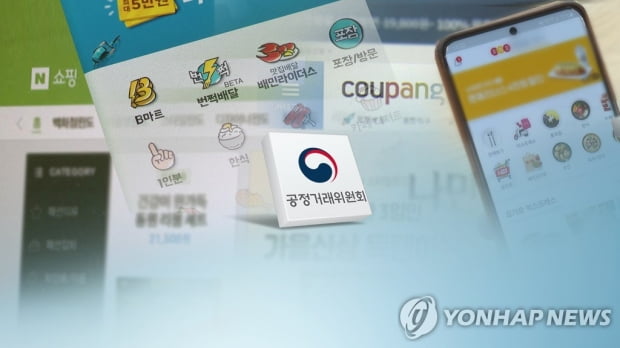Legislative notice of all amendments to the Electronic Commerce Act in 20 years
Clarification of product exposure standards such as’views’ and’sales volume’… You need to indicate whether or not you are advertising
Chairman of the Fair Trade Commission “Emphasis on rational blocking of consumer damage and substantial relief”
In the event of consumer damage, legislation will be promoted in the direction of ensuring that online platform operators such as Naver, Coupang, 11th Street, and the People of Delivery take responsibility in solidarity with the participating companies.
In addition, if shopping product search results are displayed in vague criteria such as’Popularity’ and’Ranking’ rather than in the order of number of views and sales volume, a plan to receive sanctions will also be promoted.
The Fair Trade Commission announced on the 7th that it announced a legislative notice of the revised bill of the’Consumer Protection Act in e-commerce, etc.’ (e-commerce law) by the 14th of next month.
The revised bill is expected to take effect one year after the passage of the National Assembly and its promulgation.
◇ The platform is also liable for compensation if it confuses consumers or damages them by intention or negligence.
The Fair Trade Commission prepared an amendment because the e-commerce law enacted in 2002 had limitations in responding to the changed market conditions as it was designed around the old-style mail-order sales.
In particular, it focused on strengthening the responsibility of online platforms such as portals, open markets, delivery and lodging apps, and SNS, which have grown explosively.
The amendment has created a mechanism to prevent the practice of transferring all responsibility for consumer damages to the merchants because the online platform is not a party to the contract.
First of all, if an online platform operator inflicts damages on consumers by intention or negligence while directly performing tasks such as payment, payment, and refund, it has been made to take responsibility for compensation in solidarity with the affiliated company.
For example, if after purchasing a product in an open market and requesting a refund due to a defect, but not receiving the refund, the consumer can file a dispute settlement with one of the store companies or online platforms or file a lawsuit for damages.
The online platform operator is also liable if the consumer misunderstands that he or she is a party to the transaction.
This includes cases of advertising or issuing contracts in their own name, not in the name of a store, while brokering transactions.
An official from the FTC said, “It is more convenient for consumers to settle disputes against the platform rather than for a store company, and for a store company, it is possible to share the responsibility they had with the platform.” Said.

◇ The standards for product exposure are clearly… Seller’s identity information can be disclosed when used transactions are damaged
The amendment also included content that allows e-commerce businesses, including online platforms, to transparently provide information to consumers whether there is an impact of advertisements when products are exposed.
The criteria for determining the ranking of search and exposure were displayed so that the product that appears at the top of the search results is not mistaken for pure search results because of advertisements that consumers pay for on the online platform.
Instead of vague expressions such as’Popularity’ and’Ranking’, the search result ranking is displayed with a clear expression such as the number of views and the order of sales volume.
Even if advertising costs are paid or not, it must be disclosed.
Even in the case of’customized advertisements’, the advertisements were made to be disclosed so that consumers would not mistake them for popular products and purchase them.
Information related to the collection and processing of user reviews should also be disclosed in order to increase the reliability of the reviews.
The amendment also prepared measures to protect consumers of C2C platforms such as carrot market and used country.
If a product was purchased on the C2C platform and the seller could not be contacted or refunded, if the consumer filed a lawsuit, the platform operator had to inform the seller’s identity information.
◇ Requirements for the Temporary Suspension Order System are eased, and overseas business operators must designate a domestic agent.
The revised bill was also included in the amendment that requires e-commerce business operators to cooperate with product collection, collection, and disposal when the recall order is issued.
The’Temporary Suspension Order System’, which temporarily suspends the business of e-commerce business operators and prevents the spread of consumer damage, has eased the requirements so that even when there is a clear suspicion of a violation of the law.
In order to quickly remedy consumer damage, a consent voting system was introduced and an e-commerce dispute settlement committee was set up in the Korea Consumer Agency.
Large overseas business operators that do not have an address or office in Korea appointed an agent in Korea to resolve the dispute.
This is a measure to reduce damage to consumers related to direct overseas search.
Fair Trade Commissioner Sung-wook Cho said, “We reorganized the past telecommunications sales-oriented discipline system to non-face-to-face e-commerce, and put emphasis on rationally blocking consumer damage and remedying it soundly. In addition, attention was paid to providing damage relief and dispute resolution mechanisms that could protect consumer rights and interests,” he said.
Chairman Cho also said, “If a legislative legislation to promote consumer rights and interests comes out and is discussed in the National Assembly, there is no reason for the FTC to oppose it.”

/yunhap news
